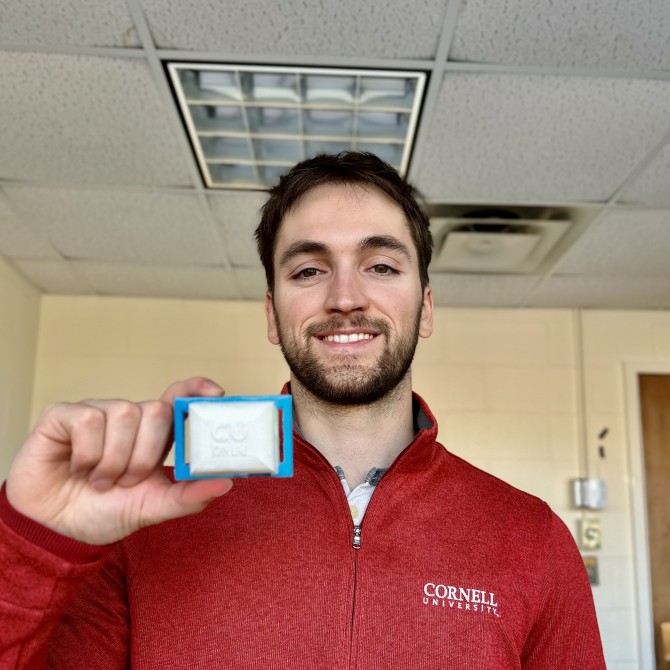News directly from Cornell's colleges and centers
Creating a remote sensor to detect health troubles
By Kathy Hovis
A Cornell doctoral student is building a company based on a radio-based technology that could sense cardiac and respiratory troubles for patients without the need for them to wear a bulky monitor or skin electrodes. SensVita, developed by electrical engineer Thomas Conroy, uses near-field radio frequency sensing.
“There are a lot of diseases that affect both the cardiac and respiratory systems,” said Conroy, who is founding the company with his father James, who has experience in the medical device industry. “And the other big advantage for our product is that it can be passive and unobtrusive.”
The device could be particularly helpful for patients with geriatric heart failure and other serious conditions, Conroy said. In these patients, 75 percent of health care costs are due to repeated hospitalizations, but having a system to monitor progression at home would allow doctors to change medication routines or prescribe other treatments before a more serious episode occurs, he said.
His sensors could be anywhere near the patient, in clothing or even furniture nearby, and are smaller than a credit card. Conroy is doing his doctoral work with Edwin Kan, a professor of electrical and computer engineering in the College of Engineering, whose lab received a patent for this sensing technology in 2018. Conroy was awarded the National Science Foundation Graduate Research Fellowship in 2019 to support his Ph.D. studies.
The technology has multiple applications in both human and animal health, Conroy said, so they’ll be exploring various avenues for commercialization. The process for a human device will be a long one, as it will need FDA approval, but a veterinary application could happen sooner, he said.
Conroy’s prototypes have already been tested at Weill Cornell, for non-invasive monitoring of conditions like sleep apnea and COPD, with more studies planned in the future focusing on various heart diseases. He’s also applied for funding from the Defense Advanced Research Projects Agency (DARPA) and for Small Business Technology Transfer (STTR) grants from the National Science Foundation and the National Institutes of Health. Conroy also went through the National Science Foundation’s iCorps training at Cornell in 2023 and has received advice from Nancy Almann at Blackstone LaunchPad and the staff of the Praxis Center for Venture Development, both at Cornell.
Conroy is also applying for an Ignite Fellowship from Cornell’s Center for Technology Licensing, which would allow him to stay on campus for a year after he graduates to do research and work on the company.
“There are so many resources at Cornell for people who want to start a company,” he said.
Media Contact
Get Cornell news delivered right to your inbox.
Subscribe

